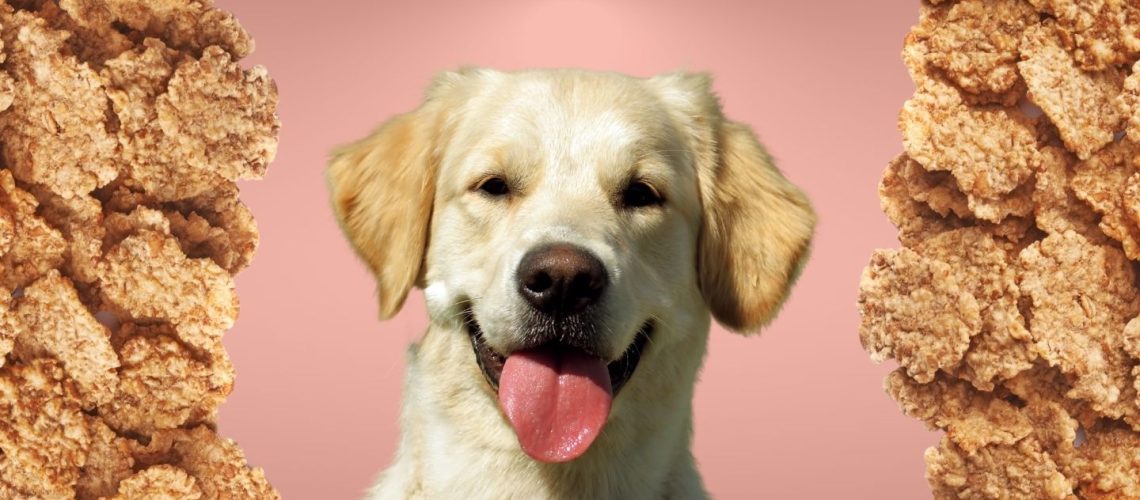The short answer is yes, dogs can eat cereal because they are facultative carnivores. However, it is important to consider the type of cereal and serve it in moderation as part of a balanced diet.
Benefits of Cereal for Dogs
Cereal can provide dogs with essential vitamins and minerals, depending on the type. For example, whole grain cereals can be a good source of fiber, which can aid in digestion and help prevent constipation.
Whole Grain Cereals
Whole grains offer a range of benefits for dogs like improving digestion and supporting overall health. Examples of dog-friendly whole grain cereals include:
- Oats
- Brown rice
- Whole wheat
Rice-Based Cereals
Rice is a good source of carbohydrates and an easily digestible grain for dogs. Some dog-friendly rice-based cereals are:
- Rice Krispies (unsweetened)
- Puffed rice cereal
- Brown rice cereal
Oatmeal
Oatmeal is a nutritious and high-fiber option for dogs. To prepare oatmeal for dogs, cook it with water (no salt or sugar) and let it cool before serving.
Types of Cereals to Avoid
Certain cereals can be harmful to dogs, so it's important to avoid these types:
Cereals High in Sugar
Excessive sugar intake can lead to issues like obesity and diabetes in dogs. Some examples of cereals high in sugar are:
- Frosted Flakes
- Fruit Loops
- Cocoa Puffs
Cereals with Artificial Sweeteners
Artificial sweeteners, particularly xylitol, can be toxic to dogs. Examples of cereals containing artificial sweeteners include some low-sugar and sugar-free options.
Cereals with Chocolate or Raisins
Chocolate and raisins can be toxic for dogs and should be avoided. Some examples of cereals with these ingredients are:
- Raisin Bran
- Cocoa Pebbles
- Chocolate-flavored cereals
Nutritional Components of Cereals for Dogs
Cereals can provide vitamins, minerals, and fiber that benefit a dog's overall health. However, they should not replace a nutritionally complete dog food and should be served in moderation.
Safety Precautions When Feeding Cereal to Dogs
Portion Control
Moderation is key when feeding cereal to dogs. A small amount, no more than a few tablespoons, can be mixed into their regular dog food or offered as an occasional treat.
Monitoring for Allergies
Some dogs may be allergic to certain grains found in cereals. Watch for symptoms like itchy skin, ear infections, and digestive issues. If you suspect an allergy, consult your veterinarian.
Chewing and Swallowing Safety
Break cereal into small pieces to prevent choking hazards. If your dog shows signs of choking or difficulty swallowing, seek veterinary assistance immediately.
Alternatives to Cereal for Dogs
Other healthy food options to consider for your dog include:
- Fresh fruits (such as apples or bananas)
- Vegetables (like carrots or green beans)
- Lean proteins (e.g., chicken, turkey, or fish)
Frequently Asked Questions about Dogs and Cereal
Some common questions about feeding cereal to dogs include:
- Can dogs eat Cheerios? Plain, unsweetened Cheerios can be a safe occasional treat for dogs.
- Is granola safe for dogs? Granola can contain high amounts of sugar, nuts, or raisins, which can be harmful, so it is best to avoid feeding granola to dogs.
Case Studies and Testimonials
Many dog owners have successfully incorporated small amounts of dog-friendly cereal into their pet's diet. Key takeaways from their experiences include offering cereal as an occasional treat, choosing a healthy cereal option, and monitoring for any adverse reactions. Maintaining a balanced diet and being vigilant about safety precautions, like preventing choking and addressing allergies, are essential for healthy dogs.











